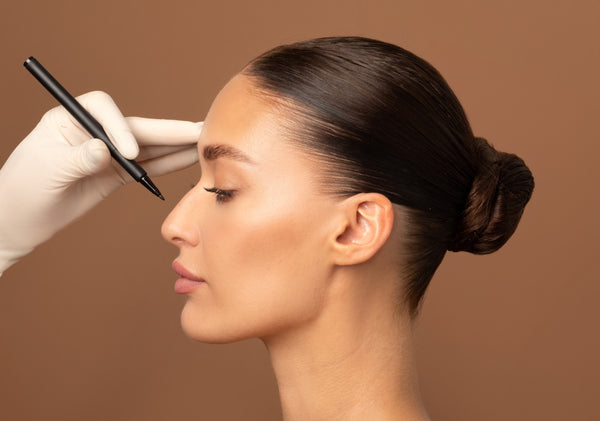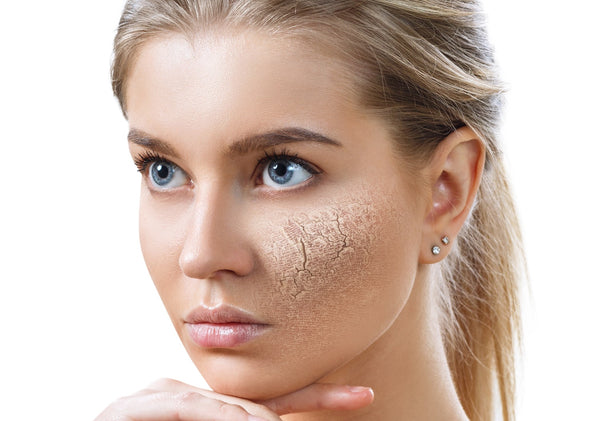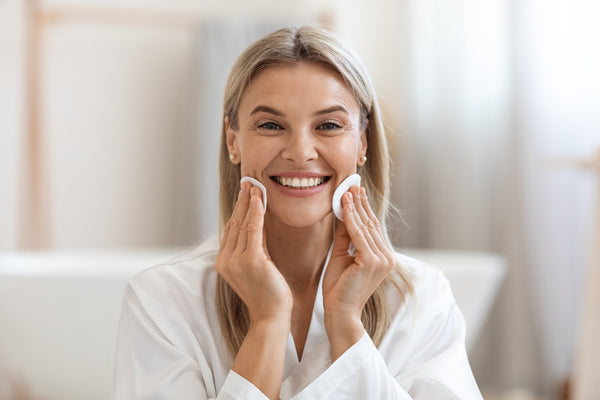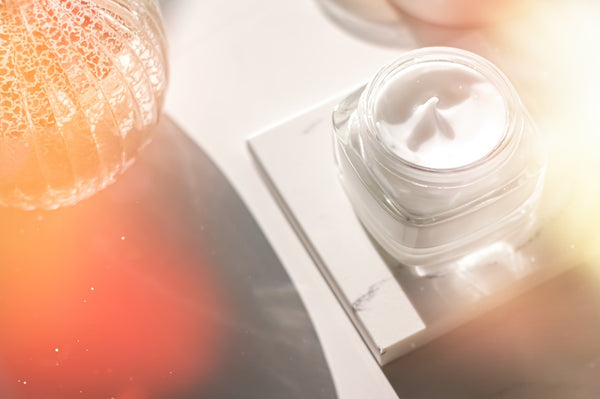Sunscreen for Acne-Prone Skin: The Pros and Cons

Sunscreen and Acne-Prone Skin: Weighing the Pros and Cons
Dealing with acne-prone skin can be a rollercoaster of emotions, and the last thing you want to add to the mix is another acne-causing culprit, like sunscreen—right?
The Sunscreen Dilemma for Acne-Prone Skin
We get it—the fear of clogged pores and breakouts is enough to make you want to ditch SPF forever. But calling it quits on sun protection? That could backfire big time, leaving your skin more vulnerable to blemishes than before.
At MD GLAM, we're all too familiar with the struggle of finding the right sunscreen for acne-prone skin. And for good reason—not all SPFs play well with textured skin types.
The good news? We’ve got the inside scoop on maintaining a radiant, breakout-free complexion while giving your skin the UV protection it deserves.
Today, we'll debunk the misconceptions about sunscreen for acne, and guide you toward products that shield and nourish your skin, as well as enhance your natural beauty.
Ready, set… glow!
Acne-Prone Skin: Causes & Symptoms
 Acne-prone skin refers to skin that's more susceptible to breakouts, blemishes, and overall skin texture.
Acne-prone skin refers to skin that's more susceptible to breakouts, blemishes, and overall skin texture.
This skin type could result from various factors, such as:
- Excess sebum (oil) production
- Clogged pores
- Acne-causing bacteria
-
Hormonal fluctuations
- Genetics
-
Stress
- Cosmetics and skincare
- Diet
- Medications
- Environmental aggressors
When it comes to skincare, acne-prone skin can react differently compared to other skin types. For instance, products made with comedogenic (or heavy) formulas can further clog pores, exasperating acne or triggering breakouts.
This is why finding sunscreen for acne-prone skin feels like such a mission. SPF formulations can vary significantly, with many containing ingredients that can worsen existing acne.
Some repeat offenders in acne-causing sunscreen formulations are:
- Heavy occlusives (like mineral oils or silicones)
- Fragrances and preservatives
- Too many chemical UV filters (like oxybenzone or avobenzone)
Its ingredients like these that create the perfect storm of clogged pores, inflammation, and heightened skin sensitivity that SPFs are notorious for.
But skimping on sunscreen over breakout fears? That's a risky game to play.
The Critical Role of Sunscreen
While acne might be the primary concern on your mind, safeguarding your skin from the sun's harmful rays is equally critical.
 Sunscreen is a must-have for everyone, especially those with acne-prone skin.
Sunscreen is a must-have for everyone, especially those with acne-prone skin.
Excess sun exposure can have detrimental effects in the long run, like clogged pores, increased oil production, and a weakened skin barrier—ultimately worsening breakouts and skin inflammation.
And don’t forget—sun damage is also a one-way ticket to visible signs of aging.
The right sunscreen, however, can be a powerful ally in preventing acne flare-ups, maintaining oil balance, and lowering your risk of hyperpigmentation. Plus, it keeps your skin looking younger for longer. Who doesn’t want that?
Understanding the importance of sunscreen for acne goes hand in hand with recognizing its impact on acne-prone skin—the undeniable good and the potential drawbacks.
Pros and Perceived Cons of Sunscreen for Acne-Prone Skin
Acne-prone skincare can be a tricky landscape, especially with so many myths to dispel. As your trusted skincare source, we’re happy to unravel the truth.
Pros of adding SPF to your skincare routine:
- Shields your skin from the effects of harmful UV rays, like sunburn, premature aging, and potential long-term damage.
- Prevents hyperpigmentation and acne scars from becoming even more pronounced when exposed to the sun's rays.
- High-quality sunscreen for acne supports your skin barrier, fortifying your complexion and reducing its susceptibility to environmental stressors.
- SPFs formulated for acne-prone skin may help regulate sebum production, reducing your risk of clogged pores and breakouts.
When chosen wisely, sunscreen for acne brings only benefits, leaving zero room for drawbacks. However, the consequences of choosing the wrong ones have given SPFs a bad rap.
Misunderstandings about SPF:

The secret to sidestepping potential pitfalls of sunscreen for acne? Knowing how to choose the right one, of course.
Choosing the Right Sunscreen for Your Skin
When you choose a sunscreen that aligns with your skin's unique needs, you’ll savor the glow of clear, protected skin for years to come.
So, which SPF formulations should you reach for?
Non-comedogenic formulations
A product labeled "non-comedogenic" is less likely to cause or worsen acne by blocking the pores. This is a crucial quality for acne-prone skin, which is already more susceptible to breakouts due to excess sebum production and the potential for pore blockages.
Lightweight, non-comedogenic formulations are ideal for blemish-prone complexions because they don't add extra weight or clog pores, allowing your skin to breathe freely.
Hybrid blend of UV blockers
Physical blockers, like zinc oxide and titanium dioxide, work by reflecting and scattering UV rays away from your skin's surface. Chemical blockers, on the other hand, like avobenzone and octinoxate, work by absorbing UV rays and converting them into less harmful forms of energy.
A healthy combination of both blockers ensures broad-spectrum protection, safeguarding your skin from UVA and UVB rays. More importantly, this balanced
approach is gentle on sensitive and acne-prone skin, reducing your chances of irritation and breakouts while offering optimal sun protection.
One SPF that checks all the right boxes?
Our very own Sunshout Sunscreen SPF 50 is a versatile multi-tasker, offering way more than just sun protection.
This lightweight, non-comedogenic formula contains the perfect blend of physical and chemical blockers and skin-loving ingredients (like vitamins, minerals, and antioxidants) to shield against harmful UV rays, prevent acne flare-ups, and foster a radiant complexion.
A sun-kissed glow, minus the worries of blemishes? Sold.
Using Sunscreen Effectively
 So, how do you add SPF to your skincare routine for acne-prone skin without triggering breakouts?
So, how do you add SPF to your skincare routine for acne-prone skin without triggering breakouts?
Here are some tips to get you started:
- Choose the right formula — Opt for non-comedogenic, lightweight sunscreens that won't clog pores.
- Cleanse thoroughly — Use a gentle cleanser to remove dirt and oil before applying sunscreen.
- Moisturize first — Apply a non-comedogenic moisturizer to maintain hydration and create a barrier between sunscreen and the skin.
- Use the right amount — Apply a generous layer of SPF to ensure optimal protection.
- Reapply diligently — Remember to reapply every two hours or sooner if you sweat heavily or get wet.
- Remove properly — At night, double-cleanse to remove sunscreen and buildup from the day.
With these tips, you can harness SPF without ever worrying about breakouts.
Sunny Days Ahead with MD GLAM!
Sunscreen-induced breakouts? Not anytime soon.
Now that you’ve mastered how to choose sunscreen for acne, your days of choosing between sun protection and clear skin are a thing of the past.
It’s time to embrace an era of healthy, luminous skin with medical-grade, luxurious skincare solutions that work with your skin—not against it.
Ready to shine bright with MD GLAM?
Stay in the loop and join our Elite SMS Experience community to unlock exclusive access to sales, promos, and expert skincare insights!













